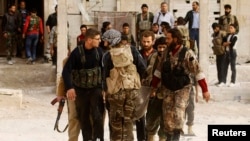WASHINGTON —
The United States is concerned about troubles facing Syria's Western-backed opposition but it will keep supporting Free Syrian Army leader General Salim Idris and the moderate opposition, U.S. Defense Secretary Chuck Hagel said on Thursday.
The United States and Britain suspended non-lethal aid to northern Syria after reports that Islamist fighters seized Western-backed rebel weapons warehouses, highlighting fears that supplies could end up in hostile hands.
The opposition to President Bashar al-Assad on Thursday said its military arm had invited Islamist fighters to secure its weapons depots on the Turkish frontier after an attack by al-Qaida militants.
“What has occurred here in the last couple of days is a clear reflection on how complicated and dangerous this situation is and how unpredictable it is,” Hagel told a Pentagon news conference.
Hagel explicitly stated that Washington still supported Idris and would keep helping with humanitarian relief.
“But this is a problem, what has occurred here, a big problem. And we're going to have to work through it and manage through it with General Idris and the moderate opposition,” he said.
Still, the U.S. and British aid cut-off underlined a crisis in the rebel leadership, which seeks international backing to reinforce its credibility and to keep fighters from joining al-Qaida-backed groups now leading the struggle against Assad.
The opposition's inability to control its own storehouses without help from Islamist groups has exposed its military weakness.
The 2.75-year conflict has killed more than 100,000 people, driven more than two million abroad as refugees and left many millions more dependent on aid.
Asked what the solution might be, Hagel said: “When the moderate opposition is set back, that's not good. But that's what we deal with.”
“But we take it straight up, work with the moderate opposition, with our allies in the area, and we'll continue to do that,” he added.
He also voiced U.S. hopes for an eventual diplomatic solution to the crisis.
But while divided world powers continue to try to bring rebels and Syria's government together for talks, Islamist militants appear to be gaining more momentum compared with moderate forces backed by the West.
“There are many dangerous elements. We know al-Nusra [Front], we know al-Qaida, we know Hezbollah, extremist groups, terrorist groups, are involved in this [conflict],” Hagel said.
“So it's not a matter of just an easy choice between the good guys and the bad guys here.”
The United States and Britain suspended non-lethal aid to northern Syria after reports that Islamist fighters seized Western-backed rebel weapons warehouses, highlighting fears that supplies could end up in hostile hands.
The opposition to President Bashar al-Assad on Thursday said its military arm had invited Islamist fighters to secure its weapons depots on the Turkish frontier after an attack by al-Qaida militants.
“What has occurred here in the last couple of days is a clear reflection on how complicated and dangerous this situation is and how unpredictable it is,” Hagel told a Pentagon news conference.
Hagel explicitly stated that Washington still supported Idris and would keep helping with humanitarian relief.
“But this is a problem, what has occurred here, a big problem. And we're going to have to work through it and manage through it with General Idris and the moderate opposition,” he said.
Still, the U.S. and British aid cut-off underlined a crisis in the rebel leadership, which seeks international backing to reinforce its credibility and to keep fighters from joining al-Qaida-backed groups now leading the struggle against Assad.
The opposition's inability to control its own storehouses without help from Islamist groups has exposed its military weakness.
The 2.75-year conflict has killed more than 100,000 people, driven more than two million abroad as refugees and left many millions more dependent on aid.
Asked what the solution might be, Hagel said: “When the moderate opposition is set back, that's not good. But that's what we deal with.”
“But we take it straight up, work with the moderate opposition, with our allies in the area, and we'll continue to do that,” he added.
He also voiced U.S. hopes for an eventual diplomatic solution to the crisis.
But while divided world powers continue to try to bring rebels and Syria's government together for talks, Islamist militants appear to be gaining more momentum compared with moderate forces backed by the West.
“There are many dangerous elements. We know al-Nusra [Front], we know al-Qaida, we know Hezbollah, extremist groups, terrorist groups, are involved in this [conflict],” Hagel said.
“So it's not a matter of just an easy choice between the good guys and the bad guys here.”





